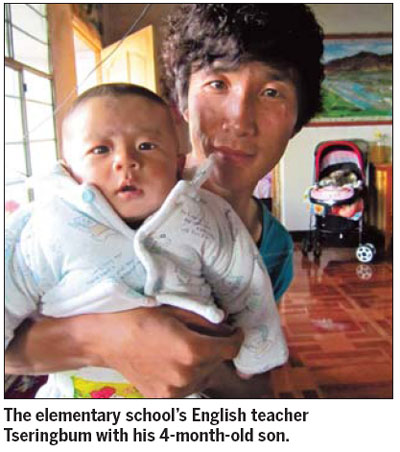Society
Teaching in 'No Man's Land'
Updated: 2011-09-13 07:46
By Erik Nilsson (China Daily)

Tseringbum recalls being amazed to discover his students didn't know how to eat eggs.
The 26-year-old primary school teacher had invited several children to his home in Yege township to enjoy the treats he had brought from far away.
"It was their first time to see eggs outside of a book," Tseringbum says. "The kids were confused by the shells and asked how to eat them."
The bananas equally mystified the kids as also the grapes he later treated them to.
Because of the harsh natural conditions - barren soil, winters as cold as -25 C and an altitude of 4,290 meters above sea level - Yege's nomadic yak herders survive almost entirely on yak dairy.
"Nothing can grow here but grass. It's hundreds of kilometers to the nearest tree," Tseringbum explains. "This place used to be known as 'No Man's Land'."
And that's why Tseringbum is here.
When the English major graduated on a scholarship from Qinghai University, he asked the government to post him to a poor settlement, which turned out to be the isolated Tibetan community in Qinghai province's Yushu prefecture.
Cracks run through the walls of the school, which was damaged in last year's earthquake that killed more than 2,000. The "dorms" are seven tents in which 78 students live, while the other 59 stay in tents or earthen dwellings with their families.
"Nobody here knew English before I arrived," Tseringbum says. "They wanted to teach it to the kids but couldn't."
Students, including 12-year-old Renzemdorgyee, say they're happy to learn other languages. Their parents are illiterate and only speak the Khams Tibetan dialect.
"English is my favorite class," Renzemdorgyee says.
"Tibetan is my second. They're interesting and fun."
Tseringbum also teaches Chinese and standard Tibetan.
"Local people's Tibetan isn't very good," Tseringbum says. "Their vocabularies are stunted because they're uneducated."
Tseringbum, whose mother tongue is the Amdo Tibetan dialect, had to master Khams after arriving in Yege two years ago. He learned much of it from the local woman he married last year. The couple had a son five months ago.
"We must be parents to the students," he says. "We do much more than provide them with academic instruction."
E-paper

Way over the moon
High inflation rockets mooncake prices out of orbit for mid-autumn festival
From death matches to child's play
Tomb raiders remain a menace
Kicking for joy
Specials

Singing success
Western musicians bring much-needed impetus to live performance industry

Salary bonanza for bosses
Top boss gets 8.78 million euros a year, far more than the State enterprise CEO with highest pay

Kicking for joy
Swedish college student represents China in Taekwondo championships
